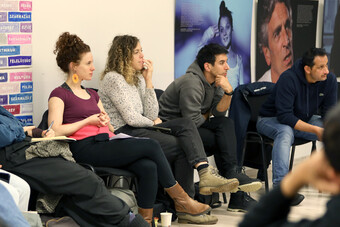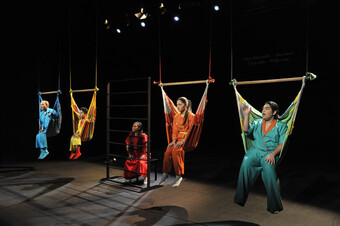Holler
Building a Culture of Constructive Critique From the Ground Up
Got issues? Of course you do. Keep’em coming—write to me at [email protected]. For previous Holler columns, go here.
Dear Holler,
I am a college student in a relatively small (but mighty!) drama program. I hope you don't mind my taking up space in a journal targeted to professionals but I've been reading the discussion following P. Carl's “Call for Critics,” so I think others out there share my problem. I am struggling with my classmates’ work. The truth is, I often don't think it's very good. I'm not being am ageist snob—there are definitely other college-aged artists whose work I've seen at festivals or read online that I find fantastic. But many of the actors and directors in my year, though nice, fun, and hardworking, just don't “have it.” Here's the problem: Our faculty makes us do endless “critique circles” where we sit around and evaluate each other's performances, direction, or playwriting.
They’re useless.
Maybe the department is scared of losing students because these otherwise respectable teachers bend over backwards to be complimentary. And we’re all tense because everyone (myself included) is trying to be polite and say positive things. Or, any negative comments are purely technical (like, “work on your diction...”). When it gets to my turn, I don't know what to say. I'll either be lying or pissing someone off. And no one is learning anything. I’ve read about professionals having similar problems—not wanting to offend or burn bridges, but also seeing a lot of low-quality work and having no way to honestly talk about it—and I think, I know where it starts! This is where I'm supposed to be engaging in serious dialogue about aesthetic choices! This is where we are supposed to develop critical distance from our own work! But instead we’re coddled and, worse yet, misled about our abilities and potential. What should I do? I'm here for another two years (unless I transfer to a conservatory, not really an option financially). I feel if I keep this up, my brain will turn to mush, and I'll miss out on an important opportunity to grow, but if I start being honest, I'll lose all my friends and no one will want to work with me.
Can't wait to hear your thoughts.
—Sick of Saying “Great Job!” and Not Meaning It
Dear Not Meaning It,
What an eye-opening, important letter. Thank you for having the guts to call it like you're seeing it. And kudos to you for following the debate in HowlRound (and elsewhere) about the role of criticism in our field, both from peers and professional critics. (Readers: You may notice that this is the second month in a row I've published a question from someone relatively early in his/her career. That's not a coincidence: I often feel, as our letter-writer eloquently points out, that many of the challenges we face in the professional world can be traced back to our training programs. We reap what we sow. But that's a topic for another column.) Now, NMI, I won't turn this into an indictment of your (or any) training program, or your colleagues, because I think there is far more to your inquiry than that. At first glance, your plight looks personal. You are the sole truth-teller, attempting to stay strong against a flood of mediocrity. But, in my opinion, you’re not hungering for more talented classmates (whatever that means), but a richer sense of artistic community.
Even though it may seem that your college community is tiny and fixed compared to the professional community, in reality, it’s not that different. Like you, we rely on strong relationships for collaboration (and friendship!), and, like you observe, if the dialogue surrounding our work is dishonest or watered-down, those collaborations and our growth suffers. Furthermore, we sometimes fear that too much honesty will offend someone, invite unwelcome retaliation, or weaken the field overall in the eyes of audience members, journalists, and supporters. Politeness, tact, decorum, etc., are all useful traits at various times (just ask Lord Grantham), but in an artistic conversation they can be deadly. In fact, how we develop is directly related to how we, as a community, are able to overcome our fears and engage in the kind of brave conversation you are talking about. We make ourselves grow. There is no shortage of external indicators of “success”—awards given by foundations, nice reviews in newspapers, and so forth—but those rewards won't in and of themselves make you a better artist. Deeply engaging in the work—the way you seem hungry to do—will. Now, here's your opportunity. Your faculty members, well meaning though they may be, are not in your community the way your classmates are. They're a little outside of it, in their own community, with their own priorities (both for you and for themselves). Just as P. is doing with this journal, re-frame the context. If these critique circles aren’t working, find one or two classmates who might be similarly inclined and take them to coffee. Use yourself as the guinea pig—ask for completely honest feedback about a recent performance. If they balk or flatter, offer a self-critique and ask if they agree. Maybe they will offer their own. Next time, invite a few more to join. Eventually, this culture may seep organically into your “official” critique circles. And I have a feeling that if you lead, your faculty will follow.
Stay on guard against the thinking that “Negative comments = good critique / Positive comments = useless critique.” Effective critique is far more nuanced than that.
Stay on guard against the thinking that “Negative comments = good critique / Positive comments = useless critique.” Effective critique is far more nuanced than that. If you haven’t already, spend a little time reading about different models of critical feedback to ensure the conversation is respectful and constructive. I’m aware of a few, but rather than take space here, I’ll let readers suggest some in the comments section. Here’s an illustrative story from a class I once taught on solo performance. In our class, every student had fine moments, but one, who was far more experienced than the others in this kind of work, set the bar for each assignment. The others were intimidated, and when the time came to discuss her work as a class, they couldn’t come up with much for her to improve on. I tried to lead the charge, knowing she was hungry for real peer critique, but to no avail. I realized that, as the teacher, there was only so much I could do to make others feel comfortable. Daniella and I came up with a plan. At her next post-showing critique, after a few gushing responses told us that this conversation would be like all the previous ones, Daniella said, “Well, I guess you’re saying my work is easy.” The others were quick to disagree, and Daniella pressed them to describe how it could be challenging when all they had were compliments. This led naturally into a discussion of how it could have been even more challenging, and from there we launched into a productive and robust critique. Once the class felt that Daniella wanted help, not adulation, they were eager to become her partners. Doing so gave them confidence (more than I ever could on my own), which in turn impacted their own work.
We successfully altered the thinking that feedback is about you telling me how I can be better, and instead built a community that comes together to make the best work possible. Your classmates, and the rest of us, are lucky to have you, NMI. Keep up this honest search. Together, we will make this the field we wish to work in. (One more note: I just want to challenge your assumption that, even if you could afford it, transferring to a conservatory would guarantee you “more talented” classmates. But more on that another time…)
Love,
Holler
The Bottom Line:
You can’t always control the ability levels (real or perceived) of those around you. But, you can build a strong artistic community by fostering a culture of honest, passionate, respectful, mutual critique. And that’s something that you’ll carry with you long after you graduate from the critique circle.












Comments
The article is just the start of the conversation—we want to know what you think about this subject, too! HowlRound is a space for knowledge-sharing, and we welcome spirited, thoughtful, and on-topic dialogue. Find our full comments policy here